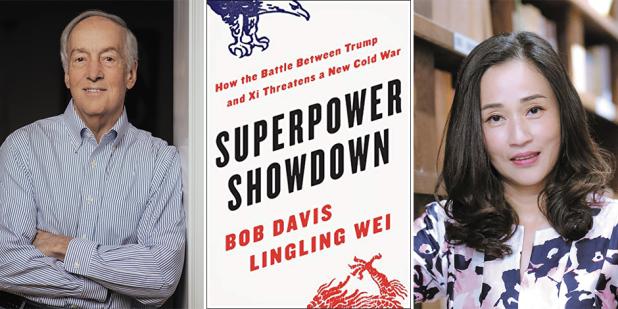Join us for a free one-day workshop for educators at the Japanese American National Museum, hosted by the USC U.S.-China Institute and the National Consortium for Teaching about Asia. This workshop will include a guided tour of the beloved exhibition Common Ground: The Heart of Community, slated to close permanently in January 2025. Following the tour, learn strategies for engaging students in the primary source artifacts, images, and documents found in JANM’s vast collection and discover classroom-ready resources to support teaching and learning about the Japanese American experience.
How did we get here? The inside story of the US-China trade war
Bob Davis and Lingling Wei, authors of Superpower Showdown, will help us understand the ramp up of US-China economic tensions and the far-reaching consequences of the stand-off.

Watch a recording of the conversation.
About the Book
Superpower Showdown is the inside story of the US–China trade war, how relations between these superpowers unraveled, darkening prospects for global peace and prosperity, as told by two Wall Street Journal reporters, one based in Washington, D.C., the other in Beijing, who have had more access to the decision makers in the White House and in China’s Zhongnanhai leadership compound than anyone else.
The trade battle between China and the U.S. didn’t start with Trump and won’t end with him, argue Bob Davis and Lingling Wei. The two countries have a long and fraught political and economic history which has become more contentious over the past three years—an escalation that has negatively impacted both countries' economies and the world at large—and holds the potential for even more uncertainty and disruption.
How did this stand-off happen? How much are U.S. presidents and officials who haven't effectively confronted or negotiated with China to blame? What role have Chinese leaders, and U.S. business leaders who for decades acted as Beijing’s lobbyists in Washington, played in driving tensions between the two countries?
Superpower Showdown is the story of a romance gone bad.
About the Authors
Bob Davis is a Pulitzer Prize–winning senior editor at the Wall Street Journal’s Washington, DC, bureau. He covers economic issues and continues to write about Chinawhere he was posted from 2011 to 2014. Davis has served as the Journal’s bureau chief in Brussels, covering the European Union, and as the Latin America bureau chief. He started focusing globalization the early 1990s and covered China's entry into the World Trade Organization. He lives in Washington, DC.
Lingling Wei is an award-winning senior China correspondent at the Wall Street Journal who works now in New York City. Hailing from a farm province in southeastern China, she came of age as a journalist in New York and then returned to China in early 2011 to report on changes in her homeland. She was forced to leave Beijing in 2020 when China expelled American journalists. She focuses on the intersection of Chinese politics and the economy.
Register in advance for this webinar: https://usc.zoom.us/webinar/register/WN_wiVlafmgSPKWKCdeWxpBiw. After registering, you will receive a confirmation email containing information about joining the webinar.
Featured Articles
Please join us for the Grad Mixer! Hosted by USC Annenberg Office of International Affairs, Enjoy food, drink and conversation with fellow students across USC Annenberg. Graduate students from any field are welcome to join, so it is a great opportunity to meet fellow students with IR/foreign policy-related research topics and interests.
RSVP link: https://forms.gle/1zer188RE9dCS6Ho6
Events
Hosted by USC Annenberg Office of International Affairs, enjoy food, drink and conversation with fellow international students.
Join us for an in-person conversation on Thursday, November 7th at 4pm with author David M. Lampton as he discusses his new book, Living U.S.-China Relations: From Cold War to Cold War. The book examines the history of U.S.-China relations across eight U.S. presidential administrations.




